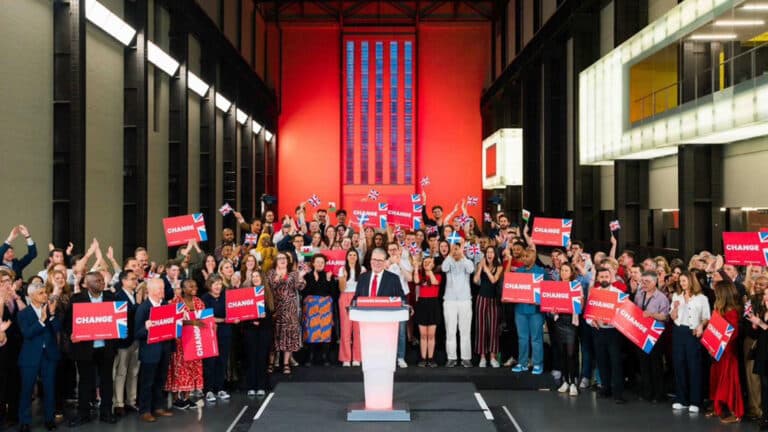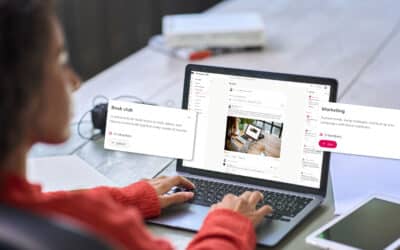It seems unlikely that Noel Gallagher will be popping round to Number 10 to meet Keir Starmer and celebrate Cool Britannia a la Tony Blair (more on that later), but what will the new Labour government mean for business, culture and tech?
Here are some reactions so far, let’s start with Andy Burnham seeing the exit poll on Sky News:
Watch moment Manchester's mayor @AndyBurnhamGM sees the exit poll for the first timehttps://t.co/fwW1wsuE8v
— Sky News (@SkyNews) July 4, 2024
📺 Sky 501, Virgin 602, Freeview 233 and YouTube pic.twitter.com/IEYy5FOAlc
“We welcome the Labour Party’s commitment to invest in digitalisation and empower the domestic tech sector, including plans to create a Regulatory Innovation Office to update regulation, reforms to accommodate greater investment into data centres, and new ten-year R&D budgets to create longer-term tech partnerships and boost innovation,” said Alan Price, CEO at BrightHR in Manchester.
“The value of the technology sector in the UK is set to grow exponentially over the next few years, and strategic investment will be critical to ensure that tech businesses can continue to thrive against a backdrop of global economic uncertainty. Labour has emphasised its support for our sector, and we look forward to seeing how these changes will be implemented in the coming weeks and months to maximise the incredible economic potential of tech enterprises in the UK.”
Caroline Norbury, Chief Executive of Creative UK stated:
“This moment of change for the UK is an opportunity to maximise our growth and resilience, if driven by political imagination and ingenuity. We face huge challenges that we need creativity to overcome, since innovation and collaboration are critical to prosperity, health and our place in the world. It’s artists and creatives who imagine a better future for us all – telling the stories that bring us together, inspiring our future leaders, and helping governments work smarter.
“It’s fitting that Sir Keir Starmer stood within the Tate Modern to share early reflections. This signal that a new UK Government will place the Cultural and Creative Industries at the heart of industrial strategy is, perhaps, also a sign of hope that the creative sector is finally also being understood as a public good.
“What we need now is policy into practice. The prioritisation of a transformative curriculum which values creativity and develops our capability. Bold approaches to funding and finance through patient capital, with the Treasury focused properly on growth. Investment in regions and communities, in order to really help creative organisations thrive. For our sector to top the list of public investment priorities, reflecting its size, contribution and potential.
“For Creative UK, now’s the time to really roll up our sleeves and ensure that this new UK Government delivers the best in these areas and more. We’re committed to working with all elected representatives to champion the creative economy, so that our future is bright.”
Andy Harrower, CEO of Directors UK said
“With the election of a new Labour Government, we reiterate our call to ministers to introduce the following measures which will make a real improvement to the working lives of the UK’s freelance film and TV directors.
“We must work together to foster an ever-flourishing creative industries sector which generates economic growth and jobs across the country.
“1. Introduce a Freelancer Commissioner in Whitehall to represent and defend the interests and concerns of the UK’s 4.3 million freelancers who often fall through the cracks of the UK’s tax, pension and benefits system.
“2. Introduce a Smart Fund to pay creatives for the private copying and consumption of their content on digital devices such as laptops and mobiles, and fund grassroots arts schemes that will foster greater industry diversity.
“3. Ensure the AI sector — through robust regulatory action — respects the UK’s ‘Gold Standard’ IP Copyright Regime and honours their obligations to that system through transparency, accountability and financial compensation.”
Rhys Merrett, Head of Tech PR at The PHA Group was quick to suggest that tech was going to be a key Labour priority:
“Labour’s victory comes at significant time for the UK economy. Expectations are high, the opening months critical for Labour in showing they are the real party for change.
“Tech has been recognised as a core pillar of the economy, so for Labour to instill real change for the sector, it needs to do the following.
“First, reaffirm London as a global tech and fintech hub. Promote foreign investment, address local skill gaps and ensure the capital will comfortably remain Europe’s capital for tech innovation.
“Second, look beyond London to support innovation happening across the country and ensure these companies can effectively scale-up. Use the tech sector to lead on regional regeneration, particularly in the North. Manchester and Leeds have a thriving community of tech businesses. Any attempt to tap into the potential of north must involve tech.
“Third, attract international tech companies to set-up in the UK, whether for investment, product launches or a general expansion. There is significant interest in the UK from fintechs across Europe, the US, MENA and Asia – this has to be capitalised on.”
IAB UK’s Head of Policy & Regulatory Affairs, Christie Dennehy-Neil said:
“The incoming government represents not only a change but a valuable opportunity to take stock and reassess how to address challenges within the online ecosystem. We’re calling on Labour not to automatically pick up where the Conservatives left off when it comes to making policy decisions about further regulation of digital advertising, and to take time to carefully interrogate the evidence and define its priorities.
“We’re looking forward to working with the new Government and our members to continue to evolve the regulatory framework in an evidence-based and proportionate way. It’s in everyone’s interests to strike the right balance between managing the risk of consumer harm and supporting the UK’s digital advertising industry – and the wider digital economy that it drives – to thrive.”
Culture Shock
Things are never that easy though and surprise, surprise, the first headache for Starmer will be Culture, Media and Sport.
It’s a department that’s become known for its revolving door of Secretaries of State and the anticipated incumbent lost her seat last night.
The Shadow Secretary of State for Social, Media & Sport, Thangam Debbonaire, had been pretty much told by Starmer that the role was hers. And then the Green Party beat her into second place in Bristol Central.
With a Bristol constituency and its strong broadcasting base for BBC and Channel 4, plus the hint that the professional musician and Chetham’s School of Music alumnus had been clubbing in Manchester in the 80s, there were high hopes.
There were some red flags, of course, mainly that she’d never actually been to a football or rugby match and also mentioning “Cool Britannia”:
“When we’re in power, arts and culture are made central. We were just reminiscing in the green room about ‘Cool Britannia’ and other moments,” she said earlier this year.
“I’m hoping we get to do something like that, we won’t call it ‘Cool Britannia’, but we’ll do something like that together. This is what we do, every time.”
She may no longer be an MP, but looking through some of her speeches in the last few months, at least there’s a hint of where Labour are thinking when it comes to culture, media and sport:
“Music, films, fashion and theatre by British artists and institutions are the country’s greatest export. Our sporting events like the Premier League, the Ashes or Wimbledon are watched by millions and our media institutions like the BBC and Channel 4 produce award-winning shows and provide incisive coverage of major global events. The Tourism sector is a huge generator of jobs and helps showcase our culture to the world,” she said.
“Culture, media, and sport give us so much joy and a feeling of togetherness. They inform us of what is happening around us playing an important role in our great democratic tradition, one which I am proud to be a part of. They also make a massive contribution to the taxes which fund our public services.”
On the BBC and Public Sector Broadcasting, she told i that the BBC must change with the times and “be fair to licence-fee payers, especially in a cost of living crisis.”
She added:
“The BBC is one of our greatest institutions. To make sure it carries on informing, educating and entertaining for generations to come it needs to change with the times and be fair to licence fee payers, especially in a Tory cost of living crisis.
“Labour is clear the BBC must continue as a universal, publicly owned, publicly funded public service broadcaster, with funding that is sufficient and sustainable.
“We will work constructively with the BBC to make sure its funding model is fit for the 21st century.”
So we’ll wait to see who gets the job.
Tech and Innovation
One MP who won with a 19,791 majority is former Shadow Science, Innovation and Technology Secretary and Hove MP, Peter Kyle.
He was a strong supporter of the European Union and rebelled against the Labour whip in order to vote in favour of an amendment to keep the UK in the European Economic Area in the event of Brexit. He’s since spoken in favour of Labour accepting Brexit.
In the September reshuffle, he was named Shadow Science, Innovation and Technology Secretary.
At London Tech Week, he said that the Department for Science, Innovation and Technology (DSIT) would become “the digital centre for government. It will be a dynamic, innovative resource for departments, responsible for delivering common platforms, and removing roadblocks to data exchange across the public sector.”
He added that he planned to ease planning and procurement processes to help computer companies build large data centres. The aim being to “supercharge” the UK tech sector, so it could compete with Silicon Valley and other international rivals.
“Britain is uniquely positioned to benefit from new technologies like AI,” he said in the speech, adding that his party would “place technology at the heart of our missions and unblock tech barriers to restart the engine of our economy.”
Labour also plans to set up a Regulatory Innovation Office to improve accountability and promote cross-sector innovation in regulation; and they want to make the current voluntary AI safety rules legally binding.
“We don’t seek to disrupt the voluntary code, but we will certainly will make sure standards are maintained and that any new entrants into the market will know that there’s a legislative foundation that must be adhered to,” he said.
Artificial Intelligence and Intellectual Property has been a recurring theme in the Labour party.
At the Creative Cities Convention Debbonaire stated:
“Labour believes both in human-centred creativity and the potential of AI to unlock new creative frontiers,” as she stated that copyright and IP was the “bedrock of our successful creative industries.”
“It is the way that we protect the raw materials of the creative industries – the creative output and imagination. Getting this right will be good for the screen sector as a whole, as well as individual creatives, to protect the films and shows you’re invested in.”
Congratulations Sir @Keir_Starmer on your victory. Pleased with our first discussion.
— Emmanuel Macron (@EmmanuelMacron) July 5, 2024
We will continue the work begun with the UK for our bilateral cooperation, for peace and security in Europe, for the climate and for AI.
Business and Trade
Another key member of Labour’s Shadow Cabinet was Jonathan Reynolds, who’s been Shadow Secretary for Business and Trade since 2023. The MP for Stalybridge and Hyde told the Labour Party Conference that he believed the party was the “undisputed party of business.” He followed this up in a speech to state his role was “to listen, to engage, to communicate our plans clearly, and to try and solve problems – rather than cause them.”
In the same speech to the CBI in November last year, he talked of his plans for a “total business environment.”
“To start with, I do intend, to give you the number one thing you’re asking for:
“Stability.
“It might not sound glamorous.
“But you all know what I’m talking about.
“The bedrock to economic success has to be certainty and stability. It has been lacking in recent years.”
He added that during his 2 year stint as Shadow Business Secretary, he shadowed 5 different people, “we have had three prime ministers, we’ve had four chancellors.”
He said he’d set up an Industrial Strategy that would coordinate the work of the whole government, with an Industrial Strategy Council made up of business and union leaders, “placed on a statutory footing.”
“And it will report against the Government’s progress in the same way the committee for climate change does for net zero targets.
“It’s about having good, effective policy.
“But it’s also about providing confidence that the UK has the institutions to make us a stable and consistent place to invest.
“On things like carbon capture, hydrogen, life sciences and quantum computing.”
On sustainability, he talks about a Green Prosperity Plan, “with its mission to deliver clean power by 2030, represents a huge opportunity.
“That plan, and the creation of GB Energy, is about public investment that acts as the catalyst to create the case for the private investment we want to attract.
“It’s about crowding in, not crowding out.”
Turning to entrepreneurialism he explained to the CBI:
“[…] we want to unlock the barriers to investment that are holding you back.
“Our Start-Up, Scale-Up review proposed ways to strengthen the British Business Bank, and the availability of growth capital, we will continue to develop those plans following the work of the Capital Markets Industry Taskforce.
“And this work is alongside our specific commitments to help small businesses, by tackling things like late payments, to strengthen devolution and the role mayors play in their local economies, and to replace business rates with a fairer system.”
It’s expected that the new Prime Minister will announce his new Cabinet over the next couple of days.
Meanwhile Channel 4’s election coverage had its viral moments, from sweets:
The presenters of #C4BritainDecides are left speechless after being caught eating liquorice. Watch NOW on @channel4 until 9am. #GeneralElection2024 pic.twitter.com/9crIZvh0TI
— Channel 4 (@Channel4) July 5, 2024
to Nigel Farage clearly not reading a memo:
Nigel Farage says that Reform is not represented on TV
— Farrukh (@implausibleblog) July 4, 2024
Emily Maitlis, "First prediction of the night that Nigel Farage has got wrong"
Ann Widdecombe, "I think, possibly, he's not watching Channel 4" pic.twitter.com/08IINT52PR
and Alastair Campbell and Nadine Dorries getting on about as well as you’d expect:
"I find that quite a sexist comment, Alastair", Nadine Dorries responds to Alastair Campbell saying "you got to get over Boris Johnson" on #BritainDecides #GE2024 https://t.co/4bVobruiUJ pic.twitter.com/iJf2IxlAVK
— Channel 4 (@Channel4) July 4, 2024














